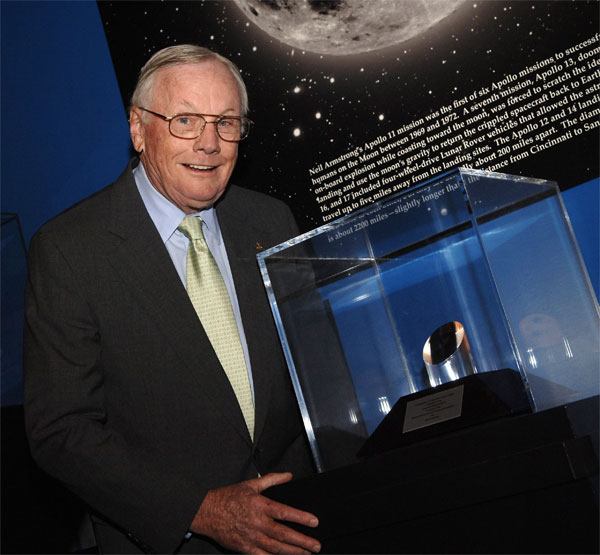Neil Armstrong, First Moonwalker, Lands in New York

NEW YORK ? Neil Armstrong, the first man to walk on themoon, touched down in rainy Manhattan Sunday and urged the public to take amore active interest in the military conflicts facing the United States.
Armstrong, 79, spoke to a crowd of more than 1,000 people,including Cub Scouts and other young children, who gathered at the IntrepidSea, Air and Space Museum here to welcome the famed Apollo11 astronaut and other aerospace legends home from a tour of military basesin Europe and Southwest Asia.
?I hope that all of you, and allof those with whom you came, take an interest in the conflicts in which ournation is involved,? said Armstrong,who received a standing ovation from the crowd. ?Become informed about theimportance and the reality of this major commitment of our society, so that youcan feel like you personally know enough that you can have an opinion aboutit.?
Armstrong appeared alongside Air Force Gen. (ret.) SteveRichie, the last USAF pilot ace, and Bob Gilliland, who served as the chieftest pilot for the development of the SR-71 Blackbird supersonic spy plane. Thethree men visited military bases and installations across Europe and SouthwestAsia as part of the ?Legends of Aerospace? tour.
?There?s a big war going on out there and it?s hard tounderstand what it?s like sitting at home and watching it on the news,? saidArmstrong, who served as a U.S. Navy aviator from 1949 to 1952 and flew 78combat missions during the Korean War.
Former NASA astronauts Gene Cernan? the last man to walkon the moon during the final Apollo 17 flight ? and Jim Lovell, whocommanded the Apollo 13 mission that nearly ended in disaster, alsoparticipated in the Legends of Aerospace tour. But they were unable to attendSunday?s welcome ceremony, which was delayed one day due to bad weather in NewYork.
More than 2,000 people braved torrents of rain Saturday tosee Armstrong, Lovell, Cernan and the others speak atthe Intreprid. But the plane carrying the speakerswas diverted to Boston due to the poor weather. Most of the speakers took atrain to New York City, instead.
Breaking space news, the latest updates on rocket launches, skywatching events and more!
Armstrong did not reflect on his role as the commander ofNASA?s Apollo 11 flight ? the first mannedmoon landing - which he commanded in July 1969. On that mission, Armstrongand Lunar Module pilot Buzz Aldrin landed their Eaglelander at what they later named Tranquility Basewhile crewmate Michael Collins orbited overhead in the Columbia command module.
Armstrong was the first to set foot on the moon, a momentthat he dubbed ?one giant leap for mankind.? He and Aldrinspent 3 1/2 hours walking on the moon during the Apollo 11 moon shot.
The first moonwalker also did not comment on NASA?s recentshift in plans to cancel its Constellation program in charge of building newspaceships and rockets to replace the aging space shuttle fleet.
NASA?s three space shuttles are due to be retired later thisyear after four final missions. President Barack Obama ordered NASA to scrap the program as part of his 2011budget proposal, and directed the space agency to support the development ofcommercial spacecraft to carry astronauts instead.
But Armstrong kept his comments focused on the U.S. troopsoverseas.
?Americans can be very, very proud of the young men andwomen that are out there defending freedom,? Armstrong said.
- Apollo11 in Photos: The First Manned Moon Landing
- Buzz Aldrin Gears Up For 'Dancing with the Stars'
- SPACE.comSpecial Report: The Moon ? Then, Now, Next

Tariq is the award-winning Editor-in-Chief of Space.com and joined the team in 2001. He covers human spaceflight, as well as skywatching and entertainment. He became Space.com's Editor-in-Chief in 2019. Before joining Space.com, Tariq was a staff reporter for The Los Angeles Times covering education and city beats in La Habra, Fullerton and Huntington Beach. He's a recipient of the 2022 Harry Kolcum Award for excellence in space reporting and the 2025 Space Pioneer Award from the National Space Society. He is an Eagle Scout and Space Camp alum with journalism degrees from the USC and NYU. You can find Tariq at Space.com and as the co-host to the This Week In Space podcast on the TWiT network. To see his latest project, you can follow Tariq on Twitter @tariqjmalik.
